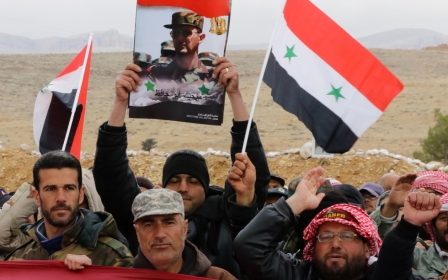Syria's Assad: Sometimes moody, other times rational, but mostly desperate

The United States Council on Foreign Relations held a panel discussion earlier this month on whether Syrian President Bashar al-Assad can still play a future role in his country, given that many hold him responsible for this millennium’s bloodiest conflict.
The discussion painted a picture of a man with many faces. Sometimes rational, sometimes moody - but the overarching trait was desperation.
When Assad came to power in 2000, he was promoted as a young, dynamic moderniser. The 34-year-old London-educated ophthalmologist appeared Westernised and quickly implemented reforms, generating trust and belief among a lot of Syrians.
There were reports that he was a fan of Phil Collins, and rumours that he even liked Pepsi. But as David Lesch, Professor of History at Trinity University, pointed out in the panel, such reports ignore the socialisation impacts of his upbringing: Assad was a child of the Arab-Israeli conflict, the Cold War and Lebanon’s war.
He experienced all of this as the child of Hafez al-Assad, a brutal dictator who did not hesitate to kill tens of thousands of Syrians during an uprising in the 1980s. It was these surroundings, not his dabbling with Western culture, that affected him the most deeply. These shocks convinced him of the need to stick with loyalists to secure his own survival.
Reform the state? No way
On 30 March 2011, Assad gave a long-awaited speech to the nation. It was his first after unrest had erupted two weeks earlier in the wake of the Arab Spring.
Thousands of Syrians had already been killed and the international pressure on the leadership was high. The expectation was that the president would announce reforms, but that did not happen.
According to Lesch, there was a considerable debate among the leadership, even up until the last minute, about the question of how to react to the protests. A lot of officials were fairly surprised by the final speech’s intransigence.
Andrew Tabler, Fellow at the Washington Institute for Near East Policy, said the president feared the same fate as his counterparts in Tunisia and Egypt. But it was not only about his position.
His Alawite minority feared oppression, even persecution, if any concessions were made that weakened their position of power in Syria.
Joshua Landis, Professor at the University of Oklahoma, has written that Syria’s Alawite minority was never integrated into Syrian society.
In 1920, when the French took over power, the Alawites were spread across the whole country and had no presence in the cities. After Hafez al-Assad’s takeover in 1970, they increasingly moved to Damascus but were considered outsiders.
The Alawites built up a relatively stable power structure in the following decades, but were utterly aware of their minority status. When a Sunni Awakening hit the region in 2011, they feared ethnic cleansing as some minorities had suffered in other countries.
Assad's use of Jihadism
However, the threat of radical Islamism and jihadism was no new phenomenon in Syria. Especially since the US invasion of neighbouring Iraq in 2003, the Assad government had comprehensively supported the Sunni resistance and became a launchpad for jihadists entering Iraq.
The idea was to externalise the threat of Islamism and take advantage of it. Of course that strategy contained high risks, and Syria’s Mukhabarat was in an intricate situation of managing the Islamist threat it had created itself - at least to some extent - in the first place.
Therefore, making concessions to the Sunnis was considered no option and Assad thought he could crush the uprising within weeks. In that context, Lesch emphasises that the president was not under the control of his father’s old guard: instead what happened was his own decision.
Save the country, be the hero
Landis believes that in Assad’s vision he would reconquer significant parts of the country and emerge as a national hero. This underlines how in a position of being a nation’s president, perceptions of reality can often be skewed.
"Many people thought he would change the system, but the system changed him," said Lesch.
Views shaped in the period before 2011 have been confirmed to Assad by the events since, cementing the belief that he has to win the war in order to survive. That explains the leadership’s brutality and ruthlessness.
Andrew Tabler characterised Assad as a borderline personality. Intelligent and rational in one moment and incomprehensible in the next.
But so far he also functions as a strong leader who manages the Alawite sphere and could avert infighting and possible overthrows. Landis compared that behaviour to the clan of Saddam Hussein, who also carried out a coup d’éetat and controlled the country with his Baath party.
Hussein’s rule, however, was characterised by a paranoid distrust that made him kill a lot of former friends and family members. The Assads never killed anyone who belonged to their family but rather united their basis through a form of consensus.
Without the president, the Alawites would start fighting among themselves in a struggle for power, Landis argues. There is no democratic tradition in Syria, and people tend to secure their influence by force.
Bleak prospects
The resulting prospects are fairly bleak: President Assad is "limited by his world"; he is stuck in an existential conflict he has to win to in order to survive. Landis describes him as indecisive and overloaded by his job.
His previous dream of establishing Syria as an internationally recognised country is shattered. Instead he is increasingly, if not completely, dependent on Russia’s and Iran’s favour.
Those two powers are keen to establish a "security belt" that reaches from Iran to Lebanon and according to Landis they will achieve that goal given the United States hesitancy and withdrawal from the region.
The Sunnis of Syria and Iraq on the other hand will suffer oppression as part of what Landis calls the "Great Sorting Out" - which means the rearrangement of population to "better fit the nation-states that were fixed after World War I". The result is a kind of instability that provides the ideal breeding ground for extremism
- Lars Hauch studied International Development in Vienna and worked as head of editorial at the German media outlet Commentarist. With a focus on the MENA region, he published a commented roundup www.menaroundup.com, in addition to writing for EAWorldview and the German CARTA.
The views expressed in this article belong to the author and do not necessarily reflect the editorial policy of Middle East Eye.
Photo: Syrian President Bashar al-Assad (C) talking with troops during a reported visit to the eastern Damascus district of Jobar on 31 December, 2014 (AFP/HO/SANA).
New MEE newsletter: Jerusalem Dispatch
Sign up to get the latest insights and analysis on Israel-Palestine, alongside Turkey Unpacked and other MEE newsletters
Middle East Eye delivers independent and unrivalled coverage and analysis of the Middle East, North Africa and beyond. To learn more about republishing this content and the associated fees, please fill out this form. More about MEE can be found here.





